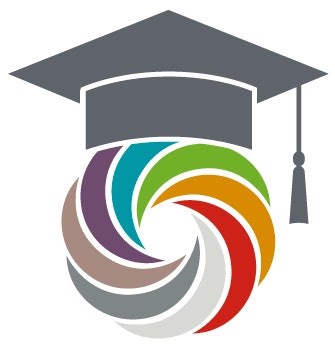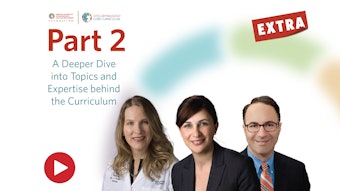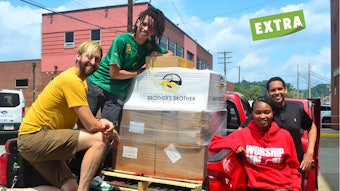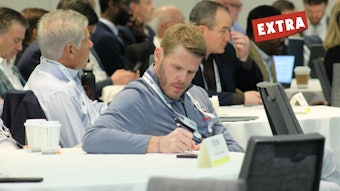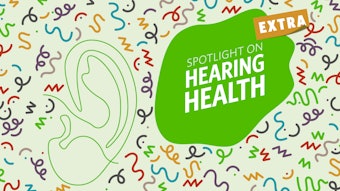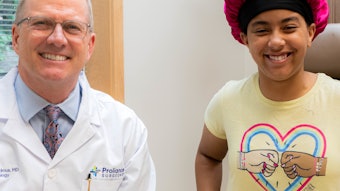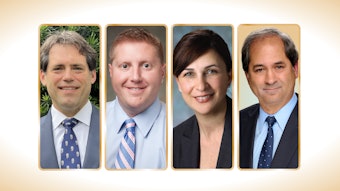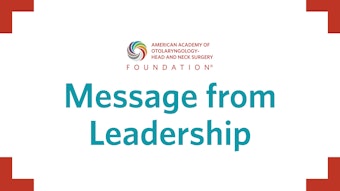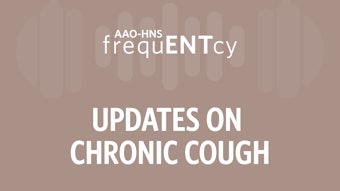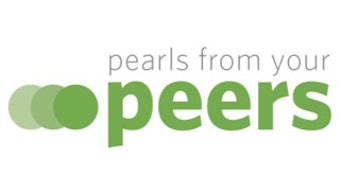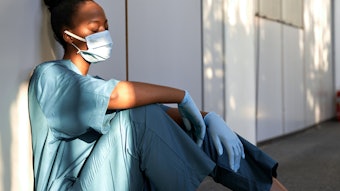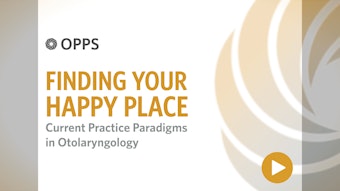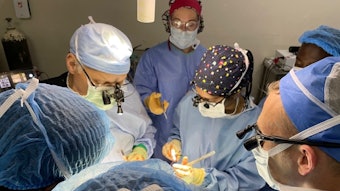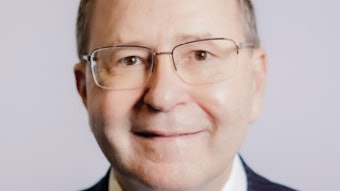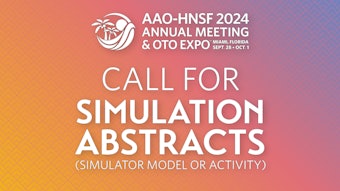Experiences of the 2023 URM Away Rotation Grant Recipients: Part 3
Five more travel grant recipients learned new skills and made life-long connections during away rotations in Michigan, Massachusetts, Alabama, Pennsylvania, and New York.
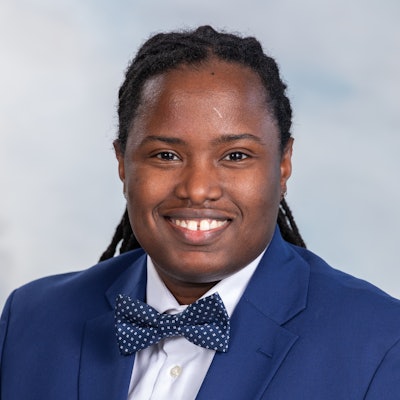 Tonya Aaron
Tonya Aaron
Thank you to the Academy for the AAO-HNS/F Diversity Endowment URM Away Rotation Grant. The funding from this grant allowed me to complete the visiting student rotation at the University of Michigan during September 2023. My first week was spent on the pediatric service, and my second week was on the Head and Neck service. The last two weeks were spent on the maize/wolverine service (comprehensive/general, otology, laryngology, and skull base/rhinology).
In the clinic, I was allowed to see patients independently. I was encouraged to acquire a complete history and physical exam and present a differential diagnosis and plan for new patients. I also had the opportunity to improve my endoscopy skills, as I was able to perform supervised flexible laryngoscopy exams.
In addition to clinical experience, I was allowed to participate in resident didactics and grand rounds. One didactic session that stood out was the lecture on grant writing, as all residents are required to submit a CORE grant application in this program. As an aspiring surgeon-scientist, I felt that this experience exposed me to the type of education I would like during my resident education because grant writing is a critical skill for those who wish to have their research funded. Furthermore, all visiting trainees are required to present on an assigned topic during the head and neck grand rounds. My presentation was titled “The Correlation Between Pharyngeal Closure Techniques and Pharyngocutaneous Fistula Formation and Associated Health Disparities in Total Laryngectomy.”
Like my clinical experience, my surgical experience was very hands-on. I was able to scrub into a variety of cases that included tympanostomy, adenotonsillectomy, functional endoscopic sinus surgery, mandibulectomy with neck dissection and reconstructive surgery, tracheostomy, direct laryngoscopy with balloon dilation, and endoscopic transsphenoidal surgery.
Completing an away rotation allowed me to experience different faculty, residents, and hospital system. Furthermore, I interacted with and learned from a different patient population and gained significant experience in the organization and preparation required to function as a resident in an otolaryngology residency program. I am grateful to the Academy and the Diversity and Inclusion Committee for their financial support and investment in my career development in otolaryngology. Throughout my career, I will mentor and invest in aspiring otolaryngologists and hope to join members of the Academy in the effort to increase diversity within the field.
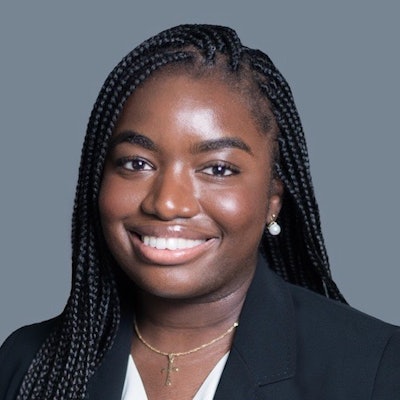 Amisheila Kinua
Amisheila Kinua
I had the opportunity to travel to Boston, Massachusetts, to participate in an away rotation with the Division of Otolaryngology at Beth Israel Deaconess Medical Center. In my pursuit of learning and developing skills for a future career in otolaryngology, conducting away rotations is essential for practicing adaptability, caring for diverse patient populations, and embracing their different geographic backgrounds. However, away rotations also involve managing multiple expenses, including rent payments, transportation, and travel fees. Thanks to support from the American Academy of Otolaryngology-Head and Neck Surgery Foundation (AAO-HNSF) Diversity and Inclusion Committee, I could offset the costs associated with my rotation and fully immerse myself in the experience of being an otolaryngology sub-intern in Boston.
The faculty and residents at Beth Israel warmly welcomed me on the first day, fostering a culture that encouraged initiative, collaboration, and engaging didactic instruction. I had numerous opportunities to independently see patients in the clinic, present cases to attending physicians, and conduct flexible laryngoscopy examinations during my consults week. Among my favorite experiences were the reconstructive flap cases, where I practiced the fundamentals of surgical technique, assisted with retraction, and was allowed to suture leg and neck incisions. During the pediatric otolaryngology week, I had the privilege of rotating at Boston Children's Hospital, gaining exposure to the full spectrum of the trainee curriculum. As the culmination of my experience, I delivered an end-of-rotation presentation that assessed the use of patient-reported outcome measures in otolaryngology research, specifically in the context of chronic rhinosinusitis. The residents and faculty asked thoughtful questions that encouraged curiosity and creativity.
In addition to my interest in programs dedicated to supporting diverse residents and faculty, I also aimed to rotate in cities close to my relatives. My cousin resides in Boston and works at the Longwood Medical Center, which allowed me to explore the historical city and enjoy lobster rolls! This month-long rotation marked a period of substantial growth in my journey as a medical student. I am profoundly grateful for the support of this grant and for Beth Israel Otolaryngology for hosting me.
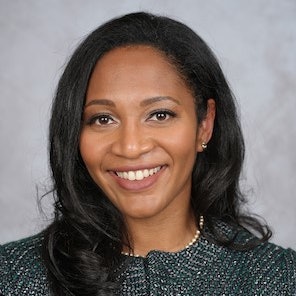 Tonja Hollis
Tonja Hollis
As an underrepresented minority student interested in otolaryngology but without a home residency program, the road to residency is challenging and sometimes feels impossible. Diversity scholarships such as those offered by AAO-HNSF, not only ease the burden but make the impossible a reality. As a recipient of the AAO-HNSF URM Away Rotation Grant, I had the pleasure of completing an integral away rotation at the University of Alabama at Birmingham in otolaryngology during the 2023 to 2024 recruitment season. During these weeks, I was exposed to the breadth and depth of the specialty, challenged clinically, and had the most fun ever.
My four-week rotation was divided into four one-week experiences on head and neck, otology and laryngology, general, and pediatric services. On each service, you are a fully integrated member of the team and participate in patient rounds, clinic, and surgeries. During my time on head and neck, I had the pleasure of participating in free-flap procedures, exploring innovative approaches to patient care, and navigating difficult conversations with families. These experiences affirmed my passion for otolaryngology and excitement for my future.
During my week in otology and laryngology, I participated in the placement of several cochlear implants, BAHAs, as well as complex diagnoses such as Eagle’s Syndrome. It was incredibly powerful to witness the first time a cochlear was activated in one of our patients and the joy on this patient’s face when she could hear using her implant. Equally powerful was the impact on the patient’s family and bearing witness to the sweetest interaction between two sisters.
Further, the opportunities at the University of Alabama at Birmingham are endless. Faculty are world-renowned; and, as a rotator, I was exposed to rare pathologies and innovative treatment options that fostered my own desires to work on the cutting edge of medicine. I would not have had this exposure and opportunity for learning if it had not been for the AAO-HNSF URM Away Rotation Grant. I simply cannot thank the Academy enough for the opportunity to explore the field of otolaryngology at a premiere institution.
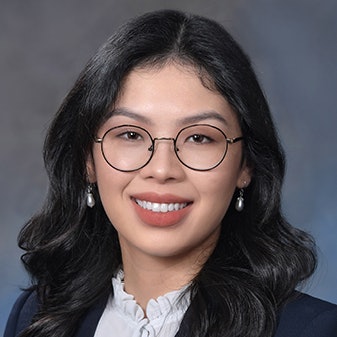 Ana Rosa Herrara
Ana Rosa Herrara
The AAO-HNSF Diversity Endowment URM Away Rotation Grant gave me the opportunity to complete an away rotation at MD Anderson and the University of Pennsylvania this past fall. My time at these rotations was with the otolaryngology department. I was exposed to various disciplines within otolaryngology, including rhinology, head and neck oncology, sleep, facial plastics, laryngology, and otology. Thanks to this grant, I experienced new cities I would not have otherwise. As a first-generation student, this grant alleviated some of the financial stress of away rotations right before application season. This allowed me to better focus on learning about otolaryngology and the institutions I was at. It also enabled me to better integrate into the teams at my away rotations and immerse myself in the experience.
My time at both MD Anderson and the University of Pennsylvania was exceptional. I saw many oncology patients while at MD Anderson, whereas at the University of Pennsylvania, I experienced all the disciplines of otolaryngology. Throughout both rotations, I was part of the team and gained hands-on experience, assisting in multiple surgeries and procedures. In clinic, I could see patients independently and learn from residents and faculty about the minutiae of managing otolaryngologic complaints. My knowledge and skills grew during these rotations, and I saw what my career in otolaryngology would be like. My opportunity to interact with patients and care for them was a true privilege and further cemented my decision to pursue otolaryngology.
The additional flexibility afforded to me by this grant allowed me to attend different national and international conferences to present my research at both meetings. I was able to participate in lectures, learn more about the latest discoveries and ongoing research around the country, and meet several outstanding individuals. I am incredibly grateful for the opportunities provided to me by the AAO-HNSF Diversity Endowment URM Away Rotation Grant, which allowed me to explore and learn more about otolaryngology across the country.
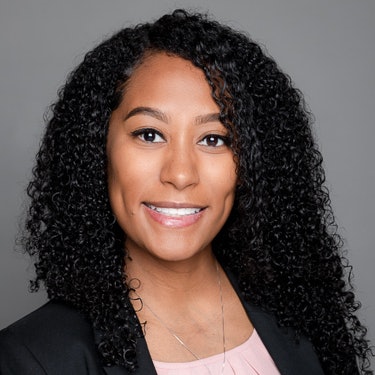 Ashley Brown
Ashley Brown
As a recipient of URM Away Rotation Grant, I was provided the opportunity to explore the field of otolaryngology at a program I may have otherwise not had the chance to participate in. As an osteopathic medical student without a home otolaryngology program, I worried about how I would be able to pursue away electives to better choose a program for my residency applications in the face of the rising cost of medical education and the associated fees.
I was fortunate enough to attend a four-week away elective at Albany Medical Center otolaryngology program in Albany, New York. The URM Away Rotation Grant helped cover the cost of travel and housing, and therefore I was able to attend my away elective unencumbered by the concerns of finances.
During my four-week rotation, I learned so much about the field of otolaryngology. This was my first experience in a residency level program, as my only experience with ENT in the past was a two-week rotation in a private practice setting. Up until that point, I had never witnessed any ENT surgeries other than a thyroidectomy and parathyroidectomy. During my away elective at AMC, I rotated through all fields of otolaryngology that I would learn as a resident at their program. As much as I thought I was interested in the sub-specialty of otology, my elective broadened my perspective of the different sub-specialties, and I developed a new passion for rhinology. The massive impact you can have on patients from in-office procedures as well as surgeries was so reassuring to witness.
In addition to being able to experience this wonderful program, the program was able to host a minority student as an auditioner. The program does not have any current or previous African American women in their residency class. Being able to visit the program allowed me to get to know the faculty and truly advocate for myself as a student and the value I would add to their program as not only an osteopathic medical student but also as an African American woman.
I am truly grateful for this opportunity that was afforded to me through the Harry Barnes Endowment URM Away Rotation Grant. This experience set up a solid foundation for my residency audition season. I felt more confident and knowledgeable about the field of otolaryngology as I made my way through the remainder of the season. Lastly, I was able to make some great friends, who very soon, may be some of my co-residents.
Thank you again to the Academy for supporting my goals and committing to increasing the diversity of the field of otolaryngology.
